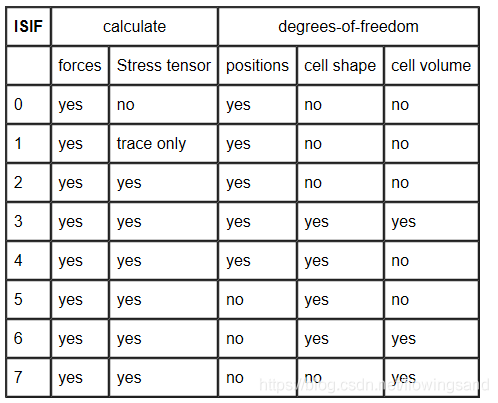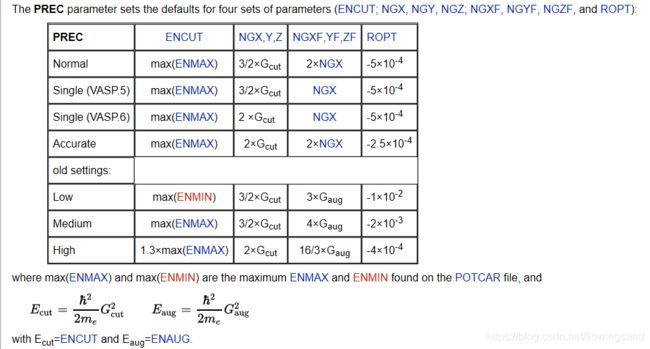【vasp笔记】结构优化(结构弛豫)
文章目录
- INCAR
- Tags
-
- ISTART
- ISPIN
- MAGMOM
- ICHARG
- LREAL
- ENCUT
- PREC
- LWAVE
- LCHARG
- NSW
- IBRION
- ISMEAR
- SIGMA
- ISIF = 3
- EDIFFG(eV/AA)
- 并行计算
INCAR
'''
Global Parameters
ISTART = 0 (Read existing wavefunction; if there)
# ISPIN = 2 (Spin polarised DFT)
# ICHARG = 11 (Non-self-consistent: GGA/LDA band structures)
LREAL = Auto (Projection operators: automatic)
# ENCUT = 400 (Cut-off energy for plane wave basis set, in eV)
PREC = Normal (Precision level)
LWAVE = .FALSE. (Write WAVECAR or not)
LCHARG = .FALSE. (Write CHGCAR or not)
ADDGRID= .TRUE. (Increase grid; helps GGA convergence)
# LVTOT = .TRUE. (Write total electrostatic potential into LOCPOT or not)
# LVHAR = .TRUE. (Write ionic + Hartree electrostatic potential into LOCPOT or not)
# NELECT = (No. of electrons: charged cells; be careful)
# LPLANE = .TRUE. (Real space distribution; supercells)
# NPAR = 4 (Max is no. nodes; don't set for hybrids)
# NWRITE = 2 (Medium-level output)
# KPAR = 2 (Divides k-grid into separate groups)
# NGX = 500 (FFT grid mesh density for nice charge/potential plots)
# NGY = 500 (FFT grid mesh density for nice charge/potential plots)
# NGZ = 500 (FFT grid mesh density for nice charge/potential plots)
Lattice Relaxation
NSW = 300 (number of ionic steps. Make it odd.)
ISMEAR = 0 (gaussian smearing method )
SIGMA = 0.05 (please check the width of the smearing)
IBRION = 2 (Algorithm: 0-MD; 1-Quasi-New; 2-CG)
ISIF = 3 (optimize atomic coordinates and lattice parameters)
EDIFFG = -1.5E-02 (Ionic convergence; eV/AA)
PREC = High (Precision level)
'''
Tags
ISTART
决定是否读入WAVECAR
0开始一个崭新的计算。
1接着计算,通常用在测试ENCUT的收敛性以及计算结合能曲线。
2接着计算,通常用在希望保持基矢不变的计算中。
3接着计算,读入上一次计算得到的电荷密度和波函数,不推荐。
ISPIN
是否计算spin polarization
默认值为1.
1不计算
2计算
MAGMOM
原子磁矩的设定
MAGMOM
= NIONS * 1.0 for ISPIN=2
= 3 * NIONS * 1.0 for non-collinear magnetic systems (LNONCOLLINEAR=.TRUE.)
【提示】MAGMOM最好从比较局域的(比较大的)值开始计算,如实验值的1.2~1.5倍,因为默认值有时不够安全(不容易收敛)。MAGMOM只在如下两种情况下有效:(1)不读取WAVECAR和CHGCAR的计算。(2)从non magnetic的WAVECAR和CHGCAR开始的计算。如果你在使用MAGMOM计算的时候发现磁矩很难收敛到你想要的结果,可以尝试先进行non-magnetic的计算,然后再从non-magnetic的WAVECAR和CHGCAR开始(ICHARG=1),加入磁矩再进行计算。
ICHARG
如何构造初始电荷密度。
Default: ICHARG = 2 if ISTART=0; =0 else.
0从初始波函数构造
1读入CHGCAR,并同原子密度进行线性插值
2取原子电荷密度的叠加
11读入自治的CHGCAR,并进行能带计算或者态密度的非自治计算
12非自治的原子密度计算
【提示】如果设为11或12,则建议把LMAXMIX设置为pseudopotentials中的最大的轨道角动量量子数的2倍。
LREAL
determines whether the projection operators are evaluated in real-space or in reciprocal space.
ENCUT
平面波切断能,默认为POTCAR中读入的值。
PREC
LWAVE
是否输出WAVECAR。
主要包含
NBAND number of bands
ENCUTI ‘initial’ cut-off energy
AX ‘initial’ basis vectors defining the supercell
CELEN (‘initial’) eigenvalues
FERWE (‘initial’) Fermi-weights
CPTWFP (‘initial’) wavefunctions
LCHARG
是否输出CHGCAR。
主要包含
the lattice vectors, atomic coordinates, the total charge density multiplied by the volume ρ ( r ) ∗ V c e l l \rho(r)*V_{cell} ρ(r)∗Vcell on the fine FFT-grid (NG(X,Y,Z)F), and the PAW one-center occupancies.
NSW
最大迭代步数。一般设置60。
IBRION
优化分为两步,第一步是update离子(原子)位置。第二步是根据确定的离子(原子)位置不断地迭代电子的情况(类似于一次静态计算),并计算出收敛的能量信息。第三步判断是否继续update离子(原子)位置。
具体离子位置优化(弛豫)的方法
-1: no update.离子(原子)位置不动
0: molecular dynamics.
1: ionic relaxation (RMM-DIIS).准牛顿法(快)
2: ionic relaxation (conjugate gradient algorithm).共轭梯度法(适中)
3: ionic relaxation (damped molecular dynamics).
5 and 6: second derivatives, Hessian matrix and phonon frequencies (finite differences).
7 and 8: second derivatives, Hessian matrix and phonon frequencies (perturbation theory).
44: the Improved Dimer Method.
ISMEAR
计算每个轨道占据数的时候如何做k空间积分。如
ISMEAR=N (N>0): method of Methfessel-Paxton order N。金属体系常用。做金属的结构优化的时候,通常用N=1或2的情况。并取SIGMA= 0.2。即(less than 1 meV per atom)。半导体或者绝缘体最好不要用这类方法,因为容易引起问题。
ISMEAR=0: Gaussian smearing. 绝缘体可用。
ISMEAR=−1: Fermi smearing.
ISMEAR=−5: tetrahedron method with Blöchl corrections (use a Γ-centered k-mesh).半导体/绝缘体可用。因为计算更加精确,所有最后计算DOS的时候采用的方法。但是一开始的结构优化未必要这么精确。
SIGMA
与具体的ISMEAR有关。
ISIF = 3
控制两个事情:1 有哪些需要算,2 有哪些自由度可以优化。
Default: ISIF= 0 for IBRION=0 (molecular dynamics); = 2 else
ISIF determines whether the stress tensor is calculated and which principal degrees-of-freedom are allowed to change in relaxation and molecular dynamics runs.

EDIFFG(eV/AA)
原子弛豫收敛标准。默认为EDIFF*10。
如果为正,表示总能只差小于EDIFFG时停止弛豫。如果为负,则原子所受最大力小于EDIFFG的绝对值时停止弛豫,一般取负值的收敛性更好,如取当EDIFF=1.0E-06时候,可以取EDIFFG=-0.01。
并行计算
KPAR = 8 # the number of k-points that treated in parallel
NCORE = 8 # the number of CPU on each band
NPAR = 8 # the number of bands that treated in parallel
